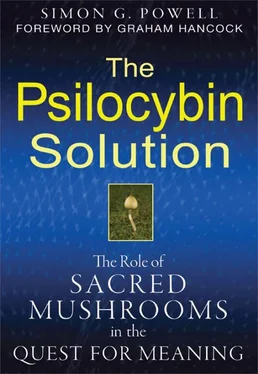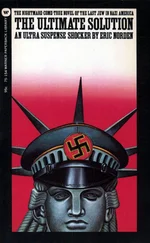Not that I really think such a thing could come to pass. One should not underestimate the cohesive power natural intelligence. It is not like life is an old car that could splutter and give out all of a sudden. If evolving life were that frail, it would surely have faded away long ago. The same applies to human culture. Despite evincing ecological insensitivity that might instigate its downfall, culture embodies tremendous cohesion and resilience, which gives us time to mature and change. And if we bring to mind the notion that the Universe is like a self-writing story, I would hope the human race is too significant a protagonist to simply eliminate.
It might be that the severe environmental crises our species has set in motion of late are a kind of violent prelude to the changes in culture and scientific worldview that lie ahead. Indeed, our global disruptions of the biosphere obviously serve to make us reflect on our important causal role within the web of life. When weather systems run riot around us, when otherwise unchanging ice caps begin to melt, when vast tracts of land are trashed in the quest for fossil fuel, when entire lakes and oceans become spoiled by pollution, when an estimated one hundred species of organism become extinct every day due to our belligerent presence, when acid rain ruins forests and crops, when fires burn uncontrollably in tropical areas where land has been decimated by farmers pandering to beef addiction, and when primarily profit-motivated biotech conglomerates cause unforeseen ecological disruptions with genetically engineered crops, then it is evident that our species is not a passive spectator of Nature. Rather we actively influence its constitution at every moment.
As Fritjof Capra remarks in The Turning Point, the Chinese written word for crisis contains two characters— danger and opportunity (or at least this is one linguistic interpretation). This implies that we now have an opportunity to make a change for the better. We can learn from our ecological perturbations and respond to them, as if ecological crises were parts of a biospherical enzyme coded into the historical process (enzymes facilitate reactions). Acknowledging our devastating impact on Nature allows us to reappraise our relationship to the Earth. In so doing we dimly perceive that we are bound to the biosphere as much as the biosphere is bound to us. Moreover, until we fully realize our purpose at the hands of natural intelligence, it seems doubtful that we will be fulfilling our allotted role within its magnificent orchestrations.
I would like to believe that as we move through the third millennium, the realization of our true purpose will become increasingly apparent. In other words, it is my hope that the proverbial old chestnut “what is the meaning of life?” will be answered as the elusive meaning continues to unfold. In fact, if what I have written bears any truth, such a realization is inevitable. Perhaps others will explore Nature’s wild entheogenic fungi and reach the same conclusions. Or perhaps scientists will begin to discuss those aspects of reality that have conspired to facilitate a self-conscious Universe and conclude that our Universe really is of profound significance. And if scientists should come to accept that everything is made of information, including consciousness, then perhaps they would also see that this information is becoming ever more integrated according to the intent of natural intelligence.

Our unusual quest is over. We set out to uncover the essential face of Nature and discovered that, as a naturally evolved species, we are caught up in a rapidly accelerating flow of information integration whose leading edge is partly focused here on Earth, particularly within our conscious perception and our digital culture. This unfolding process would appear to be impressively smart and directed toward some culmination point. Only the future can reveal the truth of these bold assertions. In the anticipatory meantime we can do no more than contemplate the issues and ideas raised and hope for the best. May the sacred wisdom of Great Nature be with you always and everywhere.

EPILOGUE
Trick or Treat?
I provided the reader with a model of consciousness that views it as a flowing pattern of information generated within an intelligent, self-organizing Universe. Once one has accepted that we and all other patterns of information are natural expressions of a self-writing language-based Universe, that Nature is everywhere smart and contextually significant, then one is compelled to go on to examine the “meaning of it all.” Only when the bigger picture has begun to be glimpsed will we realize more fully our function and responsibilities within Nature and what integrative global events to expect in the near future. I suggested that one route to ascertaining the bigger picture is to alter the information converging in the psyche by utilizing Nature’s ambient entheogenic agents. To do so is to suddenly change one’s relationship with the rest of the reality process such that one comes to be informed by the transcendental Other, the will, or intention, or intelligence that permeates Nature.
It is my firm hope that others will be able to bring back some of the profound insights to be gained from the psilocybin mushroom experience in order that a comprehensive knowledge base develop. In fact, you might recall that in chapter 4, I detailed the second wave of human-based psychedelic research. After a sociopolitically engendered empirical hiatus of some thirty years or more, scientists are once more exploring the healing potential of entheogens. With regard to the Johns Hopkins University of Medicine experiment I alluded to in chapter 4 in which psilocybin provoked positive mystical experiences in healthy volunteers, here is a summary of the findings of a 14-month follow-up study. The results are encouraging and speak for themselves:
At the 14-month follow-up, 58% and 67%, respectively, of volunteers rated the psilocybin-occasioned experience as being among the five most personally meaningful and among the five most spiritually significant experiences of their lives; 64% indicated that the experience increased well-being or life satisfaction; 58% met criteria for having had a ‘complete’ mystical experience. {48} 48 1. Griffiths et al., “Mystical-type Experiences Occasioned by Psilocybin Mediate the Attribution of Personal Meaning and Spiritual Significance 14 Months Later,” 621.
It remains for me only to give some more information as to the particulars of the psilocybin mushroom. After all, without verifying my claims, you will not know whether I fabricated the principal subject matter of this book. Indeed, perhaps the themes outlined herein have been a kind of fake, nothing more than a few wild and woolly tales built upon the fertile imagination of my mind during periods when it was too wet to venture outside. Maybe at heart I am really one of the archetypal “merelyist” reductionists of the bleak “null hypothesis” persuasion, but one who felt like writing an entertaining yarn in which the Universe could be conceived as being meaningful instead of a mindless accident.
The message, of course, is that one must always think for oneself and never take anything for granted. That, surely, is indisputable. This leaves the psilocybin mushroom experience itself as the chief substance of my unusual claims. But readers must make up their own minds as to this claim of mine that the mushroom affords useful knowledge. Let no one accuse me of reckless pointing. This book has been my pointer. You choose. You decide.
Читать дальше












